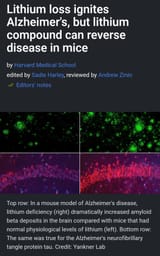Why aren't you taking lithium?
>The work, published in Nature, shows for the first time that lithium occurs naturally in the brain, shields it from neurodegeneration, and maintains the normal function of all major brain cell types.
>The findings—10 years in the making—are based on a series of experiments in mice and on analyses of human brain tissue and blood samples from individuals in various stages of cognitive health.
>The scientists found that lithium loss in the human brain is one of the earliest changes leading to Alzheimer's, while in mice, similar lithium depletion accelerated brain pathology and memory decline.
>The team further found that reduced lithium levels stemmed from binding to amyloid plaques and impaired uptake in the brain. In a final set of experiments, the team found that a novel lithium compound that avoids capture by amyloid plaques restored memory in mice.
https://medicalxpress.com/news/2025-08-lithium-loss-ignites-alzheimer-compound.html
>The work, published in Nature, shows for the first time that lithium occurs naturally in the brain, shields it from neurodegeneration, and maintains the normal function of all major brain cell types.
>The findings—10 years in the making—are based on a series of experiments in mice and on analyses of human brain tissue and blood samples from individuals in various stages of cognitive health.
>The scientists found that lithium loss in the human brain is one of the earliest changes leading to Alzheimer's, while in mice, similar lithium depletion accelerated brain pathology and memory decline.
>The team further found that reduced lithium levels stemmed from binding to amyloid plaques and impaired uptake in the brain. In a final set of experiments, the team found that a novel lithium compound that avoids capture by amyloid plaques restored memory in mice.
https://medicalxpress.com/news/2025-08-lithium-loss-ignites-alzheimer-compound.html


